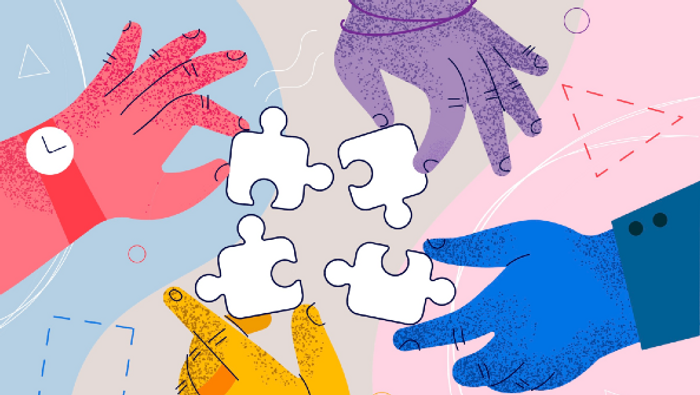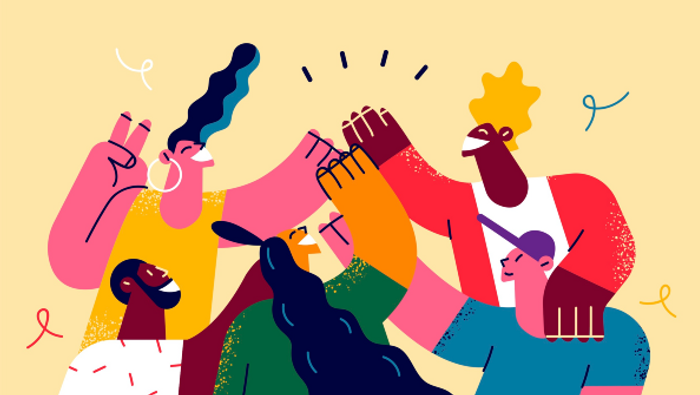Why work socials are important for employer branding
How to ensure team bonding activities are inclusive and align with your employer brand.

- 7 minute read
- Employer Branding
‘Is drinking part of the job description?’
Work socials are an essential but often overlooked part of employer branding. Thoughtful and inclusive activities promote team bonding and create memorable moments that signal the company's culture and values.
Employer review sites such as Glassdoor are full of stories about tone-deaf, uncomfortable morning karaoke sessions and drunken bosses sliding across pub tables. These stories show how getting things wrong can alienate employees and cause division.
So, why do work socials matter? And how do you ensure they are inclusive and align with your brand?
Why feeling a sense of belonging at work matters
Employee bonding is about developing closer relationships and connections between employees through a sense of community, trust, and respect.
There are significant benefits to having a well bonded team. A report from the Harvard Business Review found that teams with strong social connections between colleagues have 106% more energy at work, 50% higher productivity and are 40% less likely to see burnout in team members.
Work socials are an important part of employee bonding. They are the natural bridge between an employee’s personal and working lives. Whilst more explicitly work-relevant team building exercises and work events can help to overcome workplace challenges and encourage positive behaviours, they don’t have the same impact on promoting belonging.
Social psychologists have found that feeling a sense of belonging is an instinctive motivator that drives behaviour. Human minds work spatially: our emotions and behaviours are often guided by places and other visual cues. Encouraging colleagues to interact in spaces they don’t associate with work disrupts this. This can lead to more open communication. Over time this can result in more trusting and empathetic relationships.

Not only does liking and trusting the people you work with make you more likely to stay, but it also improves productivity and performance as teams feel more connected to their roles and feel more invested in the successful outcomes of the business. In addition to this, it boosts creativity. When colleagues trust one another, they feel more comfortable sharing innovative ideas without fearing judgement.
With work socials, unsurprisingly, one size doesn’t fit all!
If the work social is a vehicle for bringing a company culture to life, employers have to align this with their wider diversity, equity, and inclusion (DE&I) strategies.
We can’t talk about belonging and trust without acknowledging that people’s experiences of these topics within the workplace will be different. Promoting belonging, trust, and employee bonding depends on all voices being listened to and included in decision making.
Employers must accept that the perfect work social is different for each employee. However, some types of work socials are more exclusionary than others. Even if done unintentionally, these send a clear message about who the company wants to build relationships between and whose preferences are the priority.
Alcohol-related work socials are often the default. However, research by Drinkaware found that 43% of working adults felt too much pressure to drink at work gatherings, with 53% saying they would like there to be less pressure to do so.
43%
of working adults felt pressured to drink at work events
Source: Drinkaware
A company culture based too much around drinking excludes those who do not drink (whether for religious, health or personal reasons). This is not an insignificant number; in the UK this figure is around 20% of UK adults. Evening social activities can also exclude employees with parental or caring responsibilities.
And more problematically, co-workers becoming intoxicated can lead to inappropriate behaviour that disproportionately impacts female colleagues.
Additionally, some work socials ignore the needs of neurodivergent colleagues and those with severe social anxiety. For these employees, the pressures of an obligation to attend an event in a social setting that could be uncomfortable can be severely challenging and potentially trigger an episode of emotional dysregulation.
Creating inclusive work socials involves listening and learning and offering variety and choice. They can be opportunities to celebrate interests of employees, they can be opportunities to celebrate diversity and engage with events and cultural activities important to employees.
Picnics, activities such as a treasure hunt or escape room, or a day volunteering are examples of non-drinking and inclusive socials. Doing an event where people can bring their own food instead of going out to a restaurant enables people with strict dietary requirements to adjust without fearing judgement from other colleagues.

There is no greater contradiction than the phrase ‘mandatory fun’
One of the biggest challenges with work socials is getting people to participate. Those who already have social relationships with colleagues will likely attend, and those who feel more isolated or are introverted, will want to avoid, and some will have commitments that clash.
Employers need to understand that not everyone will join in. Part of being an inclusive employer is accepting this and not stigmatising these decisions. And recognising that even if employees don’t attend, they will appreciate activities that show thought and consideration for different needs.
So, what does this mean in practice? Three steps to utilise the work social to power your employer brand
Step 1: Understand
Employees like to feel consulted on company activities. So, create discrete spaces where employees can make suggestions and point out how work socials can be improved and tailored to their needs. When the purpose of an activity is building trust between colleagues, you need to listen to people and take on board any concerns.
Research into workplace social capital shows, employees are substantially more likely to recommend an organisation to others if they trust the management and feel that their needs are listened to.
Work socials are an easy way of proving that the company can respond to feedback and taking personal needs into account.
Step 2: Align
Whether intentional or not, work socials are an employer brand activation. If work socials involve competitive sporting events, it sends a message to employees that competition between employees is valued. Whereas employee bonding through outreach days will indicate that CSR is important.
No matter what you say in your marketing and communications, these moments reflect your employer brand. So, use these events to reinforce your messaging. Failing to align these work socials with your employer brand can pollute your brand and send mixed messages to employees.
Step 3: Communicate
If attendance is low to activities, review your communications. How are you communicating to employees? Is it by word-of-mouth? Then you're likely to attract the same people, creating a culture of an ‘in-crowd.’
What is the messaging? Ensure you're using inclusive language and offer a space for employees to ask for provisions and make suggestions - letting them know they are welcome.
Want more insights on inclusive employer branding?
At ThirtyThree, we have a lot of experience in helping clients in all sectors develop inclusive talent and employee engagement strategies. From building propositions and strategies to award-winning diversity and inclusion campaigns, we can bring the insights and understanding you need to engage your audiences.
If you’d like to talk about how we do it, why not get in touch - diversity@thirtythree.co.uk
Sign up now
Sign-up for our newsletter to receive a round-up of the latest insights and future events about employer branding, DE&I, and the world of work from the creative minds at ThirtyThree.





